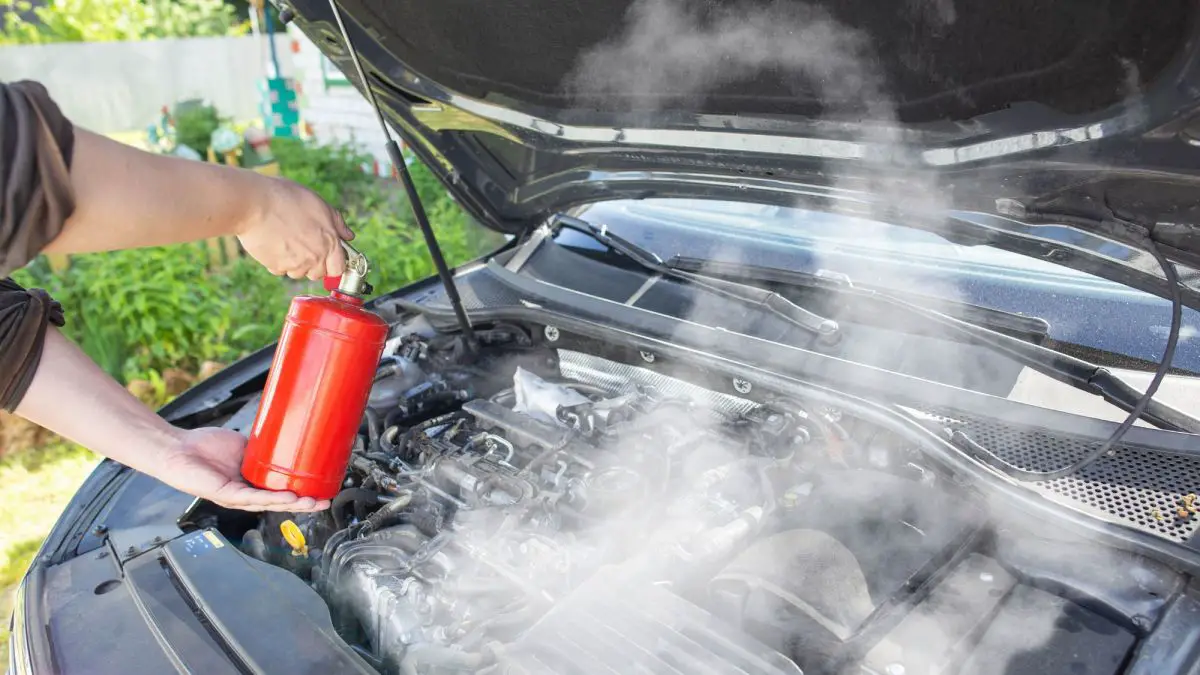Owning a car comes with its fair share of challenges, and one of the more frustrating issues drivers often encounter is overheating, especially when the air conditioning (AC) is turned on. This situation can leave you scratching your head, wondering why your vehicle’s engine suddenly gets too hot when all you’re trying to do is cool off inside.
To address this, it’s crucial to dive deep into the reasons behind this phenomenon and how you can prevent or fix it. In this article, we will uncover the reasons why your car overheats when you turn on the AC, breaking down the mechanics and offering solutions that make sense.
How Does the AC System in Your Car Works?
Before we can explain why turning on your AC causes your car to overheat, it’s important to understand how the AC system works in conjunction with the rest of the engine. The air conditioning unit isn’t an isolated system; it pulls power from your car’s engine. This extra load can affect the overall performance of the engine, especially in older cars or those with mechanical issues.
When you switch on the AC, the engine has to work harder because it powers the compressor, which is essential for cooling the air that enters your cabin. This additional strain can lead to heat buildup, especially if the cooling system isn’t working efficiently or there’s already stress on the engine. So, it’s not just the AC doing the heating, but rather a combination of factors that may have been lying under the surface waiting to be triggered.
Common Reasons Your Car Overheats When AC is On
Several mechanical components and systems within your car can be the culprits behind overheating when the AC is running. Here’s a breakdown of some of the most common reasons why this occurs.
1. Faulty Cooling System
One of the most common reasons your car overheats when you turn on the AC is a malfunctioning cooling system. The cooling system, made up of the radiator, water pump, thermostat, and cooling fan, is responsible for maintaining the engine’s temperature. If any of these components fail, the system cannot efficiently dissipate heat, especially under the added strain of the AC. A radiator clogged with dirt or a malfunctioning water pump can lead to reduced coolant flow, which makes the engine prone to overheating.
2. Insufficient Coolant Levels
Coolant is essential for keeping the engine temperature under control, and if the level of coolant is too low, the engine will struggle to manage the excess heat generated by running the AC. Coolant circulates through the engine, absorbing heat and transferring it to the radiator, where it dissipates into the air. Without enough coolant, your engine becomes vulnerable to overheating, especially when the AC demands extra power.
3. Broken or Weak Radiator Fan
Your radiator fan plays a vital role in drawing cool air through the radiator to help keep the engine temperature in check. If this fan is broken, weak, or malfunctioning, it won’t provide sufficient airflow to cool down the engine, particularly when your AC is running. Since the AC generates additional heat, the radiator fan must work at its full potential to balance the increased temperature.
4. Clogged Condenser Coils
Another potential culprit is your AC system’s condenser, which is located in front of the radiator. The condenser’s job is to release the heat absorbed by the refrigerant as it cools your cabin. However, if the condenser coils are dirty or clogged with debris, the heat cannot dissipate properly, causing a buildup that raises the overall engine temperature. This can easily result in your engine overheating.
5. Worn-Out Serpentine Belt
The serpentine belt powers several of your car’s components, including the AC compressor and the water pump. If this belt becomes worn out, it may not be able to efficiently drive the AC compressor and water pump. As a result, not only does the AC system fail to cool effectively, but the water pump may also fail to regulate the engine’s temperature properly. This leads to an increase in engine heat when the AC is turned on.
6. Faulty Thermostat
The thermostat is a small component, but it plays a big role in regulating your engine’s temperature. It controls the flow of coolant to and from the radiator. If your thermostat is stuck or malfunctioning, it could prevent the coolant from circulating properly. When the AC is turned on and adds additional heat, a faulty thermostat can cause the engine to overheat more quickly than it normally would.
How to Diagnose Overheating Issues
Understanding what causes your car to overheat when the AC is running is one thing, but knowing how to diagnose the problem is equally important. You don’t always need to be a mechanic to figure out the issue, but a basic understanding of how to check key components can go a long way in identifying the root cause.
1. Inspect Coolant Levels
Begin by checking the coolant levels. This is one of the easiest diagnostic steps you can perform on your own. Make sure your engine is cool before you open the radiator cap or coolant reservoir. If the coolant is low, top it up, and check for leaks in the system. Low coolant can also indicate a potential leak in the radiator or hoses.
2. Check the Radiator Fan
Turn on the AC and observe if the radiator fan is operating. If it’s not running, there may be an issue with the fan motor, the relay, or the fuse. You might notice that your car overheats while idling but cools down while driving. This can signal that the radiator fan isn’t working properly since the car relies on airflow while moving to cool the engine down.
3. Inspect the Radiator and Condenser for Blockages
Visually inspect the radiator and condenser for any debris, such as leaves, dirt, or bugs. Blockages can restrict airflow, causing the engine to overheat. If necessary, use a garden hose to gently wash off any buildup that could be impeding airflow.
4. Test the Thermostat
If you suspect a thermostat issue, you may need a professional mechanic to run a full diagnostic. However, if you’re comfortable, you can remove and test the thermostat by boiling it in water. If it doesn’t open at the correct temperature, then it needs to be replaced.
Preventive Measures to Keep Your Car from Overheating
Now that you know the most common reasons why your car might overheat when the AC is turned on, let’s explore some preventive measures that can keep your vehicle running smoothly and avoid these frustrating situations.
1. Regular Cooling System Maintenance
Ensure that your cooling system is regularly inspected and maintained. This means flushing your radiator at the manufacturer’s recommended intervals and checking for leaks or damage to the radiator hoses. Regular maintenance can catch problems before they become serious and lead to overheating.
2. Keep Your Engine Coolant in Check
Always keep an eye on your engine’s coolant levels, especially during the hot summer months or when you plan to drive long distances. Refill the coolant if it’s low, and ensure that the right type of coolant is being used for your car model.
3. Clean the Radiator and Condenser
Make it a habit to clean the radiator and condenser periodically, especially if you drive in dusty environments. Ensuring that air can flow freely through the radiator and condenser will improve your car’s ability to keep cool, even when the AC is running.
4. Inspect Belts and Hoses
The serpentine belt and other engine belts should be checked regularly for signs of wear and tear. Similarly, hoses connected to your cooling system should be inspected for leaks, cracks, or stiffness that could lead to malfunction.
When It’s Time to Seek Professional Help
While there are several Do It Yourself checks and preventive measures you can take, some issues may require professional expertise. If you’ve tried all the steps above and your car continues to overheat when the AC is on, it’s best to seek help from a mechanic. Issues such as a broken water pump, cracked radiator, or malfunctioning thermostat will likely need professional repair or replacement.
Final Thoughts
Overheating when the AC is turned on can be more than just an inconvenience; it’s a sign that something isn’t right under the hood. Understanding the function between your car’s cooling system and the air conditioning unit is key to diagnosing and fixing the issue. From a faulty cooling system to clogged condenser coils, several factors can contribute to your car running hot. With proper maintenance and attention to detail, you can prevent most of these issues from escalating and enjoy cool air without the added worry of overheating.
Next time your car starts heating up when the AC is on, you’ll have a better idea of what’s going on and what to do about it. So, stay cool and keep your engine even cooler!

